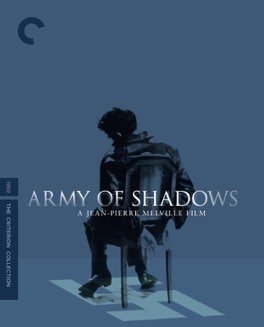JEAN-PIERRE MELVILLE
Army of Shadows
Jean-Pierre Melville is one of my all-time favorite directors. He specialized in a uniquely French approach to the familiar American trope of the gangster film, and he did it amazingly well. He made a string of these gangster films, like Bob le flambeur and Le Samouraï, that are among my all-time favorite films period. This is not one of those films, this is something else entirely, but it’s just as visually and emotionally impressive. This film was largely ignored after its release, due to a particularly unfortunate accident of timing. It came out in 1969 and has a scene where Charles de Gaulle, the former Prime Minister of France, is featured semi-positively. Honestly I didn’t even notice his presence, but when the film came out, shortly after de Gaulle’s lack of support for the May ’68 student movement, the film critics of France savaged it. The influential Cahiers du cinéma portrayed the film as a betrayal and it wasn’t until 2006 that it was finally released here in the United States. I’m incredibly thankful it was though, because this is an absolutely phenomenal film.
The film follows the story of fictional World War II French Resistance fighter Philippe Gerbier, as he leads a cell of freedom fighters through a variety of dangerous missions and incidents. As the film starts Gerbier, played unbelievably well by Lino Ventura has been captured by French Vichy authorities and sent to a German prison camp. He escapes in daring fashion and meets up with the rest of his crew. What follows is a series of connected vignettes of the lives of this cell in the resistance, still at this point a fairly small affair, as they attempt various actions and try not to get caught. There are too many different stories in the film to tell, and really you should just watch it, but we see an incredibly amount of heroism, luck, and tragedy unfold. There are betrayals, captures, escapes, deaths, suicides, you name it. And the whole story is told dispassionately, ranging from character to character, but always coming back to Gerbier. One of the incidents, near the beginning of the film, concerns getting Gerbier and his boss, resistance leader Luc Jardie, to London to meet with de Gaulle and secure additional supplies. On the way back, Gerbier, who has never parachuted before, has to jump out of a British plane while they are under fire. There are dozens of fascinating anecdotes like this, all tied to a continuing and tragic central story.
I came away from this masterpiece with a lot of conflicting emotions and thoughts. Certainly I’m thinking about how I would have acted, had I been in their position. This is something I think about a lot when it comes to World War II. My grandfather grew up in Vienna, as a fairly poor Orthodox Jewish man, and was put in a concentration camp. Somehow he escaped, he wouldn’t talk about it so I’m not entirely sure how, and fled to Sweden to study farming while attempting to emigrate to then-Palestine. Unable to get there he came to the USA, specifically NYC, and met my grandmother, fell in love, and got married. At this point no one would blame him if he decided to sit the rest of the war out, in the relative safety of his new homeland. He, more than most others, knew exactly what was happening to people like himself back in Europe. However, he decided to join the American Army instead, traveled back to Europe, fought in the Battle of the Bulge, was shot in the leg near Hanover, and won a Purple Heart. I find all of this absolutely unbelievably incredible. I think to myself, what would I have done if it had been me? Would I have had the courage, the bravery, to head back to Europe to fight for something I believed in, to fight for my parents and my family? Of course I’d like to think that I would, but you never know with these kinds of things until they happen to you, and I certainly hope I never actually have to find out.
But that’s the point really. None of the characters in this film were prepared for what they had to do, they just did it when it needed to be done. They were ordinary people who suddenly had their freedom taken away by an oppressive invader and did whatever they could to help free their country. These were electricians, and farmers, and doctors, and lawyers, and whatever. They were just everyday, you and me, people. Of course there were plenty of other people who did nothing, who simply attempted to get through this period as best they could, and that’s fine too. That’s certainly a smarter course of action, and I would assume that a lot more of those people survived the war. These people could have done that too, but they decided instead to fight, and it’s an absolutely incredible thing that they did. This film does an amazing job of showing all of this, without either deifying or demonizing these people. Certainly they felt required to carry out some fairly monstrous acts of their own, but the film shows that without defending or attacking it. That’s the most impressive feature of this film actually, the way it presents everything as just what happened, with virtually no judgment to be found. I’ve read that this is a tragedy about heroism, and I think that’s true to an extent, but what it really is, to me, is a film about regular people and what they can find themselves doing, both bad and good, under incredibly oppressive circumstances.
